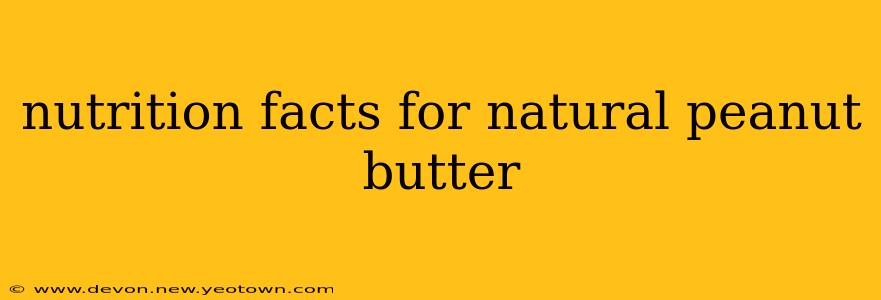Peanut butter. The creamy, dreamy spread that's been a pantry staple for generations. But beyond its deliciousness lies a nutritional powerhouse packed with benefits. This isn't just any peanut butter; we're talking about the natural kind – the one with just peanuts (and maybe a little salt). Let's explore the nutritional facts, bust some myths, and discover why natural peanut butter deserves a prominent spot in your healthy eating plan.
What are the nutritional values in 2 tablespoons of natural peanut butter?
A typical serving (around 2 tablespoons) of natural peanut butter boasts an impressive nutritional profile. You'll find a good source of healthy fats, protein, and fiber. The exact values can vary slightly depending on the brand and peanuts used, but generally, you're looking at something like:
- Calories: Approximately 190-200
- Protein: Around 7-8 grams – crucial for building and repairing tissues.
- Fat: Around 16 grams – mostly monounsaturated and polyunsaturated fats, considered "good" fats that support heart health.
- Carbohydrates: Approximately 7 grams, with a decent amount of fiber contributing to digestive health.
- Fiber: Around 2 grams – aids digestion and keeps you feeling full.
- Sugar: Naturally occurring sugars, generally minimal in natural peanut butter (check the label to avoid added sugars).
Is natural peanut butter good for weight loss?
This is a question many people ask. The answer is nuanced. While natural peanut butter is calorie-dense, the healthy fats and protein it contains promote satiety, meaning you feel full for longer. This can help with weight management by preventing overeating. However, moderation is key. Sticking to a recommended serving size is crucial to avoid exceeding your daily calorie goals. Incorporating it into a balanced diet and exercise routine is the most effective approach for weight loss.
Does natural peanut butter raise cholesterol?
The fats in peanut butter have often been a source of concern regarding cholesterol levels. However, the predominant fats in natural peanut butter are monounsaturated and polyunsaturated fats, which are generally associated with lowering LDL ("bad") cholesterol and potentially raising HDL ("good") cholesterol. Of course, individual responses vary, and consulting a healthcare professional or registered dietitian is always recommended, particularly if you have pre-existing cholesterol concerns.
What are the health benefits of natural peanut butter?
Beyond its nutritional profile, natural peanut butter offers several health benefits:
- Heart Health: The good fats, fiber, and magnesium content contribute to cardiovascular health.
- Energy Boost: The combination of protein, carbohydrates, and healthy fats provides sustained energy.
- Muscle Growth & Repair: The protein content supports muscle building and repair.
- Improved Digestion: The fiber aids in digestive regularity.
How much natural peanut butter should I eat per day?
The recommended serving size is generally 2 tablespoons. While it's a nutritious food, consuming excessive amounts can lead to increased calorie intake. Listen to your body and adjust your intake based on your individual needs and calorie goals.
Is all natural peanut butter the same?
No, not all natural peanut butter is created equal. Pay close attention to the ingredient list. Some brands may add salt or other ingredients. Opt for brands with only peanuts (and maybe a tiny bit of salt) listed on the label for the purest form.
In conclusion, natural peanut butter, consumed in moderation as part of a balanced diet, is a nutritious and delicious addition to your daily routine. Its rich profile of healthy fats, protein, and fiber makes it a versatile and valuable food for maintaining overall health and well-being. Remember to always check the label for added sugars or other ingredients and choose brands that align with your dietary needs.

